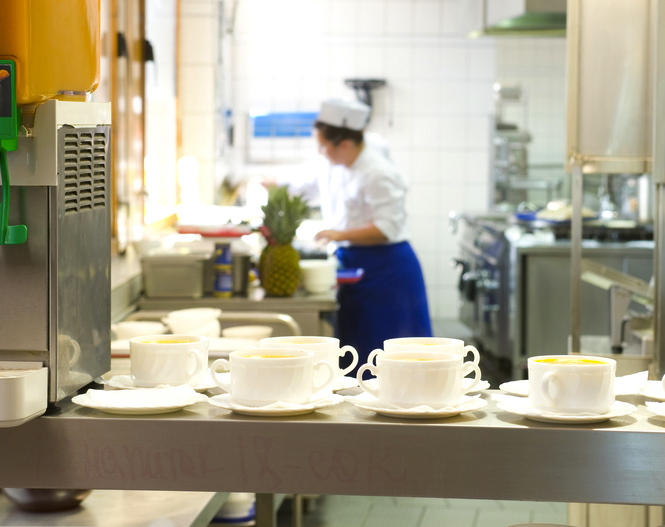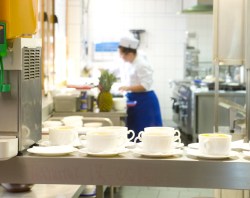Less than a year into her studies at Northeastern University, Cristina Suazo couldn’t believe what she was hearing dining hall employees say about the conditions they were working in every day.
One woman talked about the sexual harassment — a manager would come up from behind and grope her, Suazo recalls hearing, then walk away and go about the rest of his workday. “And she couldn’t do anything about it because this was her manager,” she remembers hearing.
As Suazo started to hear more stories of workers feeling disrespected or violated, or like their jobs were on the line for no good reason, she joined other students in a campaign, part of Real Food, Real Jobs, a national effort by Unite Here, to unionize dining hall workers. The goal was to convince Chartwell’s, a subsidiary of the multinational Compass Group and the company that operates the university’s dining services, to recognize the union and to negotiate a contract formalizing certain rights for the cafeteria employees. (Spoiler alert: They won recognition and are currently negotiating a contract.)
Kyle Schafer, a coordinator with Unite Here, said that union recognition is the most important step because then workers have a legal right to collective bargaining. Over the last two years, the Unite Here dining hall campaign has won union recognition or a contract for workers on 12 university campuses, including Georgetown University, Chicago State University, and Harvard Law. While each contract differs from campus to campus, they all bring to the table more affordable healthcare, mandated annual raises, and contract stipulations to maximize full-time work.
Not all students on a campus get involved in the campaign: Among Northeastern’s 15,000-plus undergraduates, for example, people like Suazo make up a tiny minority. Her motivation is particularly enlightened, and formed in part because of her religious beliefs. “They’re the ones serving the students in and out every day,” says Suazo. “I think it’s my responsibility as a consumer to know what’s behind my nourishment.”
Students like Suazo are part of a number of younger people who are drawing a connection between the healthy and organic food movements on campuses and the way food workers from around the food chain are being treated. Take the Student Farmworker Alliance, which has been pivotal in helping Florida tomato workers fight for humane working conditions, or the Real Food Challenge, a nationwide college-level effort that defines “real food” as coming from a system that “fundamentally respects human dignity.” More and more, it looks like Generation Y might just be more inclined to see people’s fundamental rights as a core aspect of sustainability. To further bring home this connection, The Real Food, Real Jobs Campaign just released a report called Our Common Ground: Food Workers, Sustainable Food Advocates, and Institutions of Higher Education, underscoring why sustainable food and better working conditions are good for students and workers alike. As a cook at Wesleyan University says in the report, “We’re on the front line of campus food. If it were bad or unsafe, we would be the most likely ones to know it.”
At Northeastern, it was up to the employees to do a lot of the initial legwork in getting the campaign started on campus, but students felt they played an important role. After all, they are the customers: the source of the food service company’s revenue.
“The students are the ones fueling this whole chain,” says Suazo. “I don’t think the administration would take the workers seriously, or make it a priority, without pressure from [us].”
University dining halls make up a huge market for the food service industry: $20 billion in annual revenues, which is more than what Taco Bell, Burger King, and Applebee’s combined rake in, according to Unite Here. Also important is the fact that most dining halls have succumbed to the trend of consolidation: Three large companies — Aramark, Sodexo, and Compass Group — now operate a majority of the campus dining hall services in the U.S. that are outsourced to private companies.
Tarshea Smith, a cashier at Georgetown University, felt the effects of that consolidation firsthand. She said she had no problems until Aramark took over. “People were really afraid, really working in fear. And we never experienced that before,” she said. “People were coming in, it was like — OK, who got fired this week?”
For Smith, the change was particularly rough because she has a health condition that occasionally sends her for emergency doctor visits, and her bosses used to understand that. But when she called in from the hospital to her boss under Aramark, she came back to work to find she had been written up.
She was frustrated, but hadn’t realized some of her colleagues felt the same way, and she had no intentions of putting up a fight. Then students approached her to ask how the new management was treating her; they were also talking with her colleagues, and eventually shared those stories and helped workers realize the problem was bigger than any one person. “We didn’t know what to do until the students reached out to us,” she said.
Now that they’ve won union recognition and a contract, she says, things are different. “I feel more respected,” she said. “We have job security — and at least we have 40 hours a week. At first, we had 37 or 35 or whatever they wanted to cut it to. Now they can’t do that anymore. If you’re a full-time worker, you need full-time hours.”
It’s about better pay and lower healthcare costs, but it’s also about something far more fundamental: respect. Smith feels so much more comfortable in her job now that she’s hoping to help others win the same battle. As a volunteer organizer, she makes house visits and talks to workers on other campuses about issues they face, to see if union organizing will help them, too.
“They helped me, now I have to help someone else,” she says. “I know what it’s like to work in fear. You’re not getting paid enough, but you have to work — you’re working two or three jobs to survive.”
Because school dining employees are often literally at the front lines of what is being served, they can also stand up for healthy, higher-quality food, at a time when many cafeterias are cutting corners. For instance, Smith recalls seeing food labeled as organic that didn’t come from a truly certified organic source, and she hopes to one day see “whistleblowing language” in cafeteria contracts to call out such practices.
The goal, she says, is that “we can have sustainable jobs, and students can have sustainable food.”




